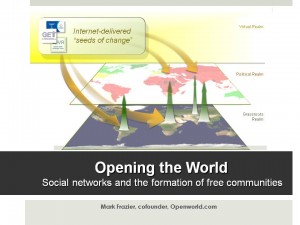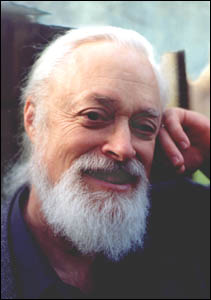
Participatory (Crowd-Sourced) Futures Planning
Advanced Cyber/IO, Analysis, Augmented Reality, Collective Intelligence, Collective Intelligence, Communities of Practice, Earth Intelligence, Ethics, info-graphics/data-visualization, InfoOps (IO), IO Mapping, Key Players, Methods & Process, Mobile, Open Government, Policies, Real Time, Reform, Serious Games, Strategy, Threats, Tools
whether talking about a intelligent knowledge infrastructure, robert's global brain, or suresh's project matching for climate change initiatives, this article seemed useful.
Noah Raford
Large-scale participatory futures systems
Futurescaper is an online tool for making sense of the drivers, trends and forces that will shape the future. As a user interface system, it is horrible. As a tool for analyzing and understanding complex systems, it works pretty well. Several people asked me about this after my last post, so here is some more detail.
Following the logic of collective intelligence (as part of my my PhD), I broke up the the scenario thinking process into discrete chunks, came up with a system for analyzing and relating them together, and then distilled them into key outputs for helping the scenario development process: 1) Emergent Thematic Maps 2) Revealing Hidden Connections 3) Drilling Down
See Also by Noah Radford:
The Three Systems, an Overview
The first system is called “Futurescaper” and was developed in partnership with the International Futures Forum (IFF), Tony Hodgson and my friend Nathan Koren. This was piloted on a project for the UK Government, exploring secondary and tertiary impacts of climate change.
The second system is called “SenseMaker Scenarios.” This uses a customized version of Cognitive Edge’s SenseMaker Suite to aggregate micro-stories about the future into themes and patterns for scenario generation. This was done with Dave Snowden and Wendy Schultz, and was unveiled at the 2010 RAHS conference in Singapore.
The third system is called “FogCatcher”, and was developed with Anab Jain and Jon Ardern from Superflux. This was based on a modified version of Jerome C. Glenn’s futures wheel, combined with a “hot or not” style cross-impact analysis engine. As before, this approach benefited greatly from previous conversations with my colleagues above, but also from others such as Andrew Curry of the Futures Company, Emile Hooge of Nova7, Indy Johar of 00:/research, Vinay Gupta and others.
All three projects are still in continuous development and available for experimental project use.
Game Changer? Internet2 Open Science Open Flow
Advanced Cyber/IO, Collective Intelligence, Communities of Practice, Cultural Intelligence, Earth Intelligence
Below I am sharing an important email from Bill St. Arnaud, as received.
– – – – – – –
At the this weeks spring Internet 2 meeting there was a major announcement on Internet 2’s new Open Science, Scholarship and Services Exchange (OS3E) initiative. This could be a real game changer. OS3E embodies the concept of “software defined networks” where users (or network operators) can configure their own network topology and architectures using OpenFlow as the underlying enabling technology. For those who are familiar with the technology will recognize many of the same features and capabilities in CANARIE’s UCLP. “UCLP is a software system that allows end-users, either people or sophisticated applications, to treat network resources as software objects and provision and reconfigure lightpaths within a single domain or across multiple, independently managed, domains. Users can also join or divide lightpaths and hand off control and management of these larger or smaller private sub-networks to other users. “
What is exciting to me about OS3E, and one of the original drivers of UCLP, is the fact that it may fundamentally change the future of R&E networking globally.
Continue reading “Game Changer? Internet2 Open Science Open Flow”
Connectivism, Time and the Brain
Advanced Cyber/IO, Augmented Reality, Civil Society, Collective Intelligence, Collective Intelligence, Cultural Intelligence, Ethics, InfoOps (IO), Methods & Process
Connectivism
by jonl on April 19, 2011
Have you ever thought about how completely irrelevant structured learning is? Indeed. “The illiterate of the 21st century will not be those who cannot read or write, but those who cannot unlearn and relearn.” – Alvin Toffler. The video below advocates a change in how we learn – network-centric, personal, based on your context, not based on some institution’s agenda. (Thanks to Judi Clark for sending me the link to this video.)
Thoughts on Connectivism from Debbie Kroeker on Vimeo.
Time and the brain
Burkhard Bilger in The New Yorker profiles David Eagleman, a brilliant researcher who’s studying the brain, consciousness, and the perception of time. At a personal level I’ve spent a lot of time in recent years studying and trying to comprehend my own degrees and levels of consciousness and perception. We think of our “conscious experience” as a constant, and our unconscious as inaccessible… but through attention we learn that there are gradations in the range of conscious to “un-” or “sub-” conscious experience; that perceptions can vary with context; that memory is selective and undependable; that our perception of the world is generally incomplete though we do a good job of filling the gaps. When David Eagleman was a child he fell from a roof and realized that his perception of time had changed as he was falling. Now he’s doing evidence-based research to determine how people experience the world, what are the variations, how does the brain work and how does the mind work? Read about it here. If you know about similar studies and writings, please post in comments.
Massive Fraud, Common Crime, No Prosecutions
03 Economy, 07 Other Atrocities, 09 Justice, 11 Society, Budgets & Funding, Civil Society, Collective Intelligence, Commerce, Corruption, Government, Law Enforcement, Money, Banks & Concentrated Wealth, Power Behind-the-Scenes/Special Interests
Why haven't any high-profile execs been prosecuted for their role in the financial crisis?
In Financial Crisis, No Prosecutions of Top Figures
By GRETCHEN MORGENSON and LOUISE STORY
The New York Times, April 14, 2011
It is a question asked repeatedly across America: why, in the aftermath of a financial mess that generated hundreds of billions in losses, have no high-profile participants in the disaster been prosecuted?
See Also:
Neil Weinberg, Corrupt Bank Oversight Is Creating New Immoral Hazard, Forbes, 14 April 2011
To me the moral of this story is that Washington has created a vast immoral hazard. We are all truly in a world of peril when regulators and law enforcers believe our financial institutions are too big to be brought to justice—and when our leadership in Washington is so gutless that its response is to let these same institutions emerge bigger and more beyond challenge than ever.
Read rest of this hard-hitting article…
Tip of the Hat to Lynn Wheeler at LinkedIn for the clean links.
Phi Beta Iota: It is our view that the President, the Attorney General, the Secretary of the Treasury, and most Senators and Representatives are immediately impeachable for failing to uphold their oaths to the Constitution and failing to represent the public interest in the face of massive legalized fraud on the part of Wall Street.
Liberation Technology Stakeholders…
09 Justice, 11 Society, Autonomous Internet, Civil Society, Collective Intelligence, Ethics, IO Technologies
Preliminary List of Stakeholders
Appropedia
Brave New Software
Creative Commons
Electronic Frontier Foundation
Free Network Movement
Free Software Foundation
FreedomBox
Future Forward Institute
New America Foundation
Open Source Ecology
P2P Foundation
Personal Data Ecosystem Consortium
Tor Project Anonymnity Online
Unhosted–Open Web Standard for Decentralizing
World Wide Web Consortium (W3C)
Phi Beta Iota: We disagree on the inclusion of the New America Foundation–they are not stakeholders as much as beltway “think-tank” opportunists, and too heavily reliant on proprietary hooks going nowhere. New Software Foundation has been changed to Free Software Foundation. We would add to the above list:
Autonomo.us
Computers, Freedom & Privacy Conference
Cook Report on Internet Protocol
Free Internet
GNU Operating System
Liberation Technology Project (Standford University)
NetZero Free Dial-Up Internet Access
Technology Liberation Front
Many others will be identified over time.
See Also:
Autonomous Internet [Open, Free, Distributed]
Next Net, Transitional Net, Autonomous Net
Charles Wyble: Autonomous Free Internet
Reference: Internet Freedom–and Control
Serious (Honest) Thinking About US Budget
03 Economy, 07 Health, 09 Justice, 10 Security, 11 Society, Advanced Cyber/IO, Budgets & Funding, Civil Society, Collective Intelligence, Ethics, Government, Military
Dear friends,
The three articles below describe major approaches to addressing the deficit — for health care, taxes and the military — that would have a greater impact on America's budget woes than ANYTHING being currently negotiated by Congress and the Obama Administration. Even better, these three things would, if implemented, actually improve the quality of life in the U.S., instead of degrading it, as so many of the current proposals would do. They give a taste of some excellent thinking emerging from the fringes of this “budget crisis” debate.
[After I wrote this I was alerted to another very interesting “People's Budget” recently released with little coverage in the mainstream media, which I recommend to those interested in alternatives.]
When I imagine a Citizens Jury, a Citizens Assembly, or any other randomly selected body of citizens convened to deliberate about the “budget crisis”, this is the kind of information I believe they should be exposed to. We don't need to undermine public health to create affordable health care. We don't need to undermine the wealth of the nation to have a reasonable tax system. We don't need to endanger American security to have a strong, affordable military.
We just need to think a bit outside of the boxes that most mainstream media, pundits, politicians and partisan activists (intentionally) put our minds in, and ask ourselves “What's the REAL problem here — and what would ACTUALLY solve it?”
How to Save a Trillion Dollars
Taxes on the Wealthy: New Top Brackets Needed for the Have Mores
Want to improve US national security? Cut the defense budget.
Continue reading “Serious (Honest) Thinking About US Budget”

